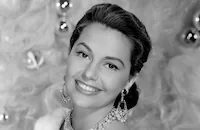Five Golden Hours

Brief Synopsis
Cast & Crew
Mario Zampi
Ernie Kovacs
Cyd Charisse
George Sanders
Kay Hammond
Dennis Price
Film Details
Technical Specs

Synopsis
In Rome, professional mourner and pallbearer Aldo Bondi lives in style by consoling recently widowed wealthy women and then graciously accepting their expensive gifts. All goes well until he falls in love with the Baronessa Sandra, whose deceased husband has left her penniless. Eager to help, Aldo persuades three rich widows to lend him money he hopes to double on the New York Stock Exchange by taking advantage of the 5-hour time difference between New York and Rome. Though the scheme works, Sandra absconds with the money. Unable to face the duped widows, Aldo decides to do away with them, but this plan, too, is bungled, and he is forced to feign insanity to avoid imprisonment. Confined in an asylum, he meets another swindler, Mr. Bing, who is also pretending to be mad. One day, one of Aldo's widows dies and leaves him her fortune on the condition that should he regain his sanity the money is to be turned over to a monastery. By offering to split with the monastery, however, Aldo is able to keep half his inheritance and return to Rome. Meanwhile, Mr. Bing has established contact with Sandra, just widowed for the sixth time, and, for a fee, informs her of Aldo's good fortune. Sandra ingratiates herself with Aldo and induces him to marry her--and shortly thereafter becomes a widow for the seventh time!

Director
Mario Zampi
Cast

Ernie Kovacs

Cyd Charisse

George Sanders
Kay Hammond

Dennis Price
Clelia Mantania
John Le Mesurier

Finlay Currie
Reginald Beckwith
Avice Landon
Sydney Tafler
Martin Benson
Bruno Barnabe

Ron Moody
Leonard Sachs
Gordon Phillott
Georgina Cookson
Hy Hazell
Joy Shelton

Marianne Stone
Maya Fabio
Arnoldo Foà
Vittorio Caprioli
Riccardo Garrone
Francesco Mulè
Franco Coop
Aldo Silvani
Franco Volpi
Crew
Stanley Black
Sartoria Sorelle Botti
Christopher Challis
Harold Clarke
Kathleen Connors
Jim Dawes
Austin Dempster
Evelyn Gibbs
Alma Godfrey
Jeff Hercombe
R. Jeffrey
Denis Johnson Jr.
Denis Johnson
John Jordan
Ivan King
Philip Leakey
Bill Lewthwaite
Terry Message
Doris Prince
A. G. Scott
Ricky Smith
John Streeter
Ted Sturgis
Cyril Swern
Ted Tester
Fulvio Testi
Lee Turner
Tommy Welsh
Hans Wilhelm
Giulio Zampi
Mario Zampi

Film Details
Technical Specs

Articles
Five Golden Hours
Kovacs plays a professional pallbearer who is also a good-hearted con man, taking advantage of grieving widows for his own gain, thus allowing him to live in style. But he gets more than he bargained for in the form of beautiful and wealthy widow Cyd Charisse, who knows how to play people herself. The title comes from a scheme whereby Kovacs makes money for Charisse by using other widows' money to play the stock markets in New York and Rome, taking advantage of the five-hour time difference to game the system.
George Sanders pops up as another con artist Kovacs meets when he is sent to an asylum after feigning insanity. "I know from one look at you that your trouble was debts," Sanders tells Kovacs. "I have the same disease myself." (In real life, Kovacs had his own financial problems. For years he did not pay income taxes out of a philosophical opposition to them, and the IRS had finally come calling, charging him with hundreds of thousands in back taxes.)
As biographer Diana Rico pointed out in her book Kovacsland, Five Golden Hours was the one movie in Kovacs' career in which he was able to play a fully rounded character who exists at the center of the story. The film also allows him to display some subtle and complex acting, as in the scene where "he plays both himself, drunk, and his greedy alter ego, with whom he struggles over the idea of killing all the widows for their money." In another scene he pretends to resist a widow's desire to invest her money with him "while simultaneously trying every wile in his power to get her to do it."
The picture was released in Europe in the spring of 1961, where it generally got good notices, and in America in the fall, where it generally did not. The New York Times complained that the British type of humor on display would have been better suited to someone like Alec Guinness than the brash Kovacs, and that a lighter touch would have been preferable. Only one actor (Sanders) and one scene (the "hilarious" reading of a will) received praise. The London Times, on the other hand, called the film "an excellent black joke."
After Five Golden Hours, Kovacs made one more feature, Sail a Crooked Ship (1961), and some TV appearances before his death in January 1962 in an L.A. car accident, just a few days shy of his 43rd birthday. He had been gearing up for a leading role in It's a Mad, Mad, Mad, Mad World (1963) -- a part ultimately played by Sid Caesar.
Director: Mario Zampi
Screenplay: Hans Wilhelm
Cinematography: Christopher Challis
Art Direction: Ivan King
Music: Stanley Black
Film Editing: Bill Lewthwaite
Cast: Ernie Kovacs (Aldo Bondi), Cyd Charisse (Baroness Sandra), George Sanders (Mr. Bing), Kay Hammond (Martha), Dennis Price (Raphael), Clelia Matania (Rosalia), John Le Mesurier (Doctor Alfieri), Finlay Currie (Father Superior), Reginald Beckwith (Brother Geronimo), Avice Landone (Beatrice).
BW-90m. Letterboxed.
by Jeremy Arnold

Five Golden Hours
Quotes
Trivia
Notes
Location scenes filmed in and around Bolzano. Opened in London in February 1961; in Rome in March 1961 as Cinque ore in contanti. Filmed in two versions; the second cast listing includes the Italian actors who replaced British artists in some of the minor roles for Italian release.














